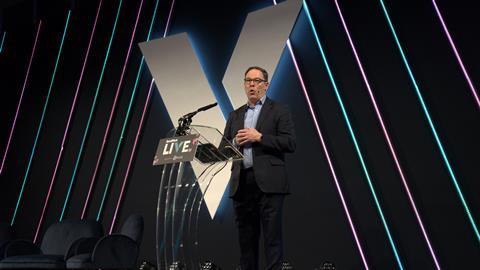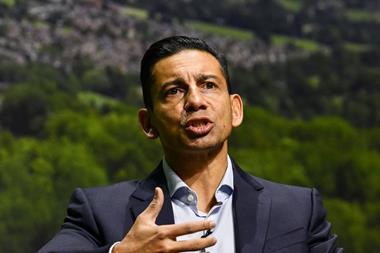Ken Murphy has made three demands for government support
Tesco Group CEO Ken Murphy has made an impassioned plea to the government for support for retail so it can help consumers in the cost of living crisis and fuel economic growth.
Using the Retail Week Live conference in London as his platform, the boss of the UK’s biggest retailer began by relaying the plight of shoppers at a recent customer panel. “Everyone was struggling to make ends meet,” he said.
“Recently I have been hearing a lot about the resilience of the consumer and cautious optimism, but the reality is one in four are in some form of food poverty and as an industry, together with government, we need to be part of the solution rather than a problem.”
Here are his three demands.
1. Fix the apprenticeship levy
Retail played a critical role in allowing social mobility, “with boardrooms of leaders who cut their teeth on the shop floor”, Murphy noted.
But its ability to do so was lessened by an apprenticeship levy system that was “unfairly prioritising senior level apprenticeships over entry level”.
“We’re not able to offer as many opportunities as we’d like to, opportunities that are desperately needed, because of outdated rules,” Murphy said.
Hindered by inflexibility in how the funds could be invested, “Tesco has now contributed more than £100m to the levy since it was launched in 2017, and we have only been able to use 14% of that.
“And it’s not just Tesco. This year alone, more than £600m of unused levy funds were returned to the Treasury. Enough to fund up to 60,000 opportunities across the UK.”
Murphy called for “systematic change” to let companies provide employment programmes focusing on “improving literacy, numeracy”, to help “a generation of job seekers who had key educational milestones disrupted by the pandemic”.

2. Ease business rates
While welcoming recent government efforts to “provide more accurate business rates bills”, Murphy said the “sheer level of these bills” still undermined bricks & mortar retail and “the broader social benefits we provide within local communities”.
His comments followed measures in the spring budget including ending so-called ‘downward transitioning’, meaning shops no longer have to wait for lower bills to be phased in over three years.
Further reform needed to “start with freezing the tax rate (the multiplier) until full reform can make business rates sustainable that would reduce upwards pressure on the cost of living and support retailers of all sizes who pay the tax.”
Murphy also slammed the slowness of the appeals system. “Appeals take too long. Three years for an outcome helps nobody. It is holding up hundreds of millions in cashflow amongst retailers which could be spent on local community investments.”
3. Make DRS fit for purpose
To help the industry drive sustainability meant “making sure that regulation to protect the planet is clear and well-designed”, said Murphy. “Sadly, this isn’t always the case.
Take the Scottish government’s deposit return scheme, due to launch in August.” In Scotland’s “race to launch first, the operational blueprint is incomplete”, he said. With mere months to go, a “long list of questions we’ve been asking for years remain unanswered”.
“From how containers will be collected to confusion over what price to display… It is simply not fit for purpose. Worse, it risks driving up prices and undermining customer confidence” with a handling fee that “does not cover retailer costs”.
“For DRS to work, it has got to cover the whole of the market.” said Murphy. The UK is a single market for soft drinks, and so the scale of a UK wide scheme seems the most logical approach.
“Finally, for consumer or market place behaviour change, it’s got to be simple. The DRS process in Scotland feels far from simple for customers, suppliers and retailers. That is a concern.
“I want Tesco to be at the forefront of change, in genuine partnership with government and regulators in Scotland and across the UK. But it must be simple, sustainable, scalable and systematic”, he added.




















No comments yet